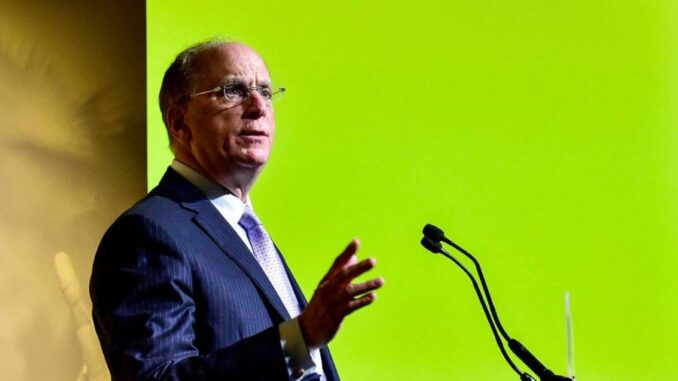
Larry Fink’s annual letter to shareholders is always closely watched for clues to what the head of the world’s largest asset manager is thinking. And, this year, it revealed just a hint of warming to cryptocurrencies.
“As we see increasing interest from our clients, BlackRock is studying digital currencies, stablecoins and the underlying technologies to understand how they can help us serve our clients,” Fink wrote.
This line was a remarkable turnround for the chief executive, who once said: “Bitcoin just shows you how much demand for money laundering there is in the world.” It seemed to reflect a broader thaw in attitudes among asset managers towards cryptocurrencies.
But, while smaller players have been quick to serve retail investors’ ravenous demand for crypto funds, major players like BlackRock, which runs the iShares funds empire, have held back — put off by volatility, regulatory worries, and the daunting logistics of running crypto investment products.
After Fink sent his letter in March, those worries were then borne out. Crypto prices suffered significant and protracted falls. Bitcoin, the largest token, lost 50 per cent of its value against the dollar between March and the end of last week, and has fallen by more than 70 per cent from its peak in November.
In May, investors’ faith in crypto was dealt a further blow after a popular token called Terra, which promised to match the value of the US dollar, collapsed, wiping out investors to the tune of more than $40bn — including many individuals who put their savings into the project.
For critics, these sharp market movements and high-profile blow ups have underscored longstanding concerns that crypto is too volatile to be a suitable fund investment, and that many of its much-hyped projects and innovations lack solid underpinnings.
Taimur Hyat, chief investment officer of PGIM Group, the $1.4tn asset manager, had been willing to consider crypto’s merits. “With a market cap well over $1 trillion, cryptocurrencies have grown too big to ignore,” he said in a recent report. “For institutional investors, they offer the allure of extraordinary and diversified returns in a market that is now of sufficient size and liquidity for meaningful institutional positions.”
But, after a detailed review, PGIM concluded the digital assets were basically uninvestable. “Despite the hype, we find little evidence that cryptocurrencies offer any meaningful opportunities for institutional investors,” Hyat explained.
Some are less sceptical, though. Even in May, as Terra’s collapse rocked the crypto world, investors put $66.5mn on average each week into virtual asset investment products, according to data from CryptoCompare. These vehicles, such as the Grayscale Bitcoin Trust and exchange-traded products, give investors exposure to crypto assets without holding the tokens directly, making it easier to get into the market.
Do-it-yourself investors, managing their own savings, are a key client base for managers that offer these products. “Crypto asset management remains a very, very retail-driven allocation,” said Jean-Marie Mognetti, chief executive of CoinShares, the Jersey-based company that offers a number of crypto exchange-traded products.
Major asset managers, such as Invesco and Fidelity International, have launched similar products for sophisticated investors. But the managers that dominate the exchange traded funds market for traditional assets — BlackRock’s iShares and Vanguard — are still on the sidelines when it comes to crypto.
Mognetti says larger players conduct exhaustive checks, sometimes taking many years, before moving forward with new offerings. “They want to see a record, they want to see audits, they want to see all these checks and balances that the typical crypto companies don’t have at the beginning,” he notes. “They have to build [up a] record,”
Unless and until the big players get comfortable with crypto products, demand from investors will be met by more specialised players.
Mognetti says companies like his have the advantage of agility and digital asset knowhow in fast-changing crypto markets — but they need to be careful not to neglect investor protections. “People are always saying you have to go superfast,” he says. “It’s about finding the right balance between going fast and offering something that is half-cooked and half-baked.”
Regulation has also impeded the launch of crypto funds. In the UK, the Financial Conduct Authority has opposed giving retail investors exposure to crypto through fund structures, while the US Securities and Exchange Commission has yet to approve several managers’ applications to launch a spot crypto ETF. US firms have, instead, used crypto futures to track the price of tokens.
Ophelia Snyder, co-founder and president of 21 Shares, the Swiss-based crypto funds group, believes acceptance of digital assets has already come a long way.
“When we launched the product four years ago, no one would touch it,” recalls Snyder, who counts Ark Invest founder Cathie Wood as a mentor. “The level of technical detail you need is quite high. That reality disproportionately benefits specialised firms.”
Her company and others in the industry are banking that the dramatic crypto price falls of recent times are a bump in the road, and demand for their products will continue to grow. “It is painful early for the sector,’ Snyder says. “It is painful, painful early for exchange-traded products.”






Be the first to comment